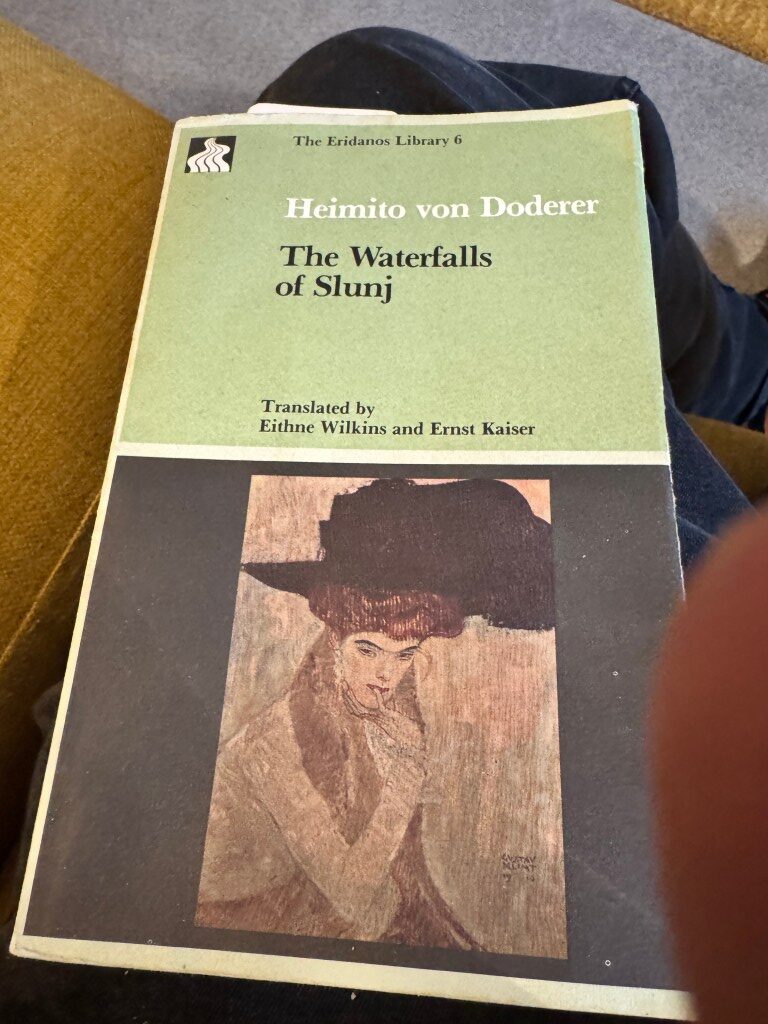
The Waterfalls of Slunj by Heimito Von Doderer
Austrian Fiction
Original title – Die Wasserfälle Von Slunj
Translators – Eithne Wilkins and Ernst Kaiser
Source – Personal copy
I’m back on with a classic, I will still be trying to read mainly classic this year. Oddly, today is the first day I have felt my usual bookish self this year. This year, I have struggled to read, blog, and use social media. So I was so happy I managed to sit earlier and read under pages in a coffee shop. Thought about the upcoming weeks. One of the books I struggled to get through this year was by Austrian writer Heimito Von Doderer. He was born into a privileged family at the time, one of the wealthiest families in Austria. I have two other books, the one that came out from NYRB a while ago and the genuinely epic two-volume The Demons, which was republished by an American publisher and has over 1000 pages. This book was meant to be a multi-volume series, but he only wrote this, and the second volume was published after he died. So we are thrown into The Tale, the end of the Austor Hungarian Empire. The book was meant to be seven books from 1880 – 1960, but only the first two were released.
However, all these rather grand houses, each standing alone at the edge of the grassy park, suffered from the same fundamental trouble. They were damp. Their basements were dank as dungeons. But just at this time, when the Claytons settled down here, a Vienna firm put on the market a drying-stove of a new design. The poster by means of which this new product was brought to the public notice was terrifying. It showed the new stove standing in the gloom of a cellar, its maw fiery; from the left and the right side of the stove there grew arms with fists uplifted; and from this monster panic-stricken toadstools and mildewy hobgoblins were fleeing, their faces contorted with mortal fear, while the wildly flickering rays of ferocious heat from the stove’s mouth pursued them in their headlong flight, decimating them. One could scarcely help feeling sorry for these doomed creatures, these little galloping fungus legs, wailing toadstools, and hurrying vapors. That poster of the stove with the threatening, whirling fists was to be seen in Vienna for many years. It was still there in the time of little Donald Clayton.
Grand House was a world the writer grew up in !
The book follows the Claytons and the English industrialist family trying to set up and move into the Austro-Hungarian with their new Office in Vienna. Along with this, the title of the book comes from the fact. Early in the book, Robert and Harriet, the parents of the two main characters, their sons Robert and Donald, spend the Honeymoon at the Hotel at the Falls, located in Croatia. This book sees the sons setting up the factory and the people working in the factory [particularly Chwostik, the deputy director of the Factory, who used to live with p[prostitutes. The factory makes agricultural machinery and, in some shadow,s actual companies working there at the time. It captures the later end of the 19th century as the world suddenly sped up. As we see how, all, this world is a lot of characters and, in a way, memories of the time. It all stems from the Claytons, the father and his sons.An epic book that also has a bit of humour at times and sees a world long gone and, as it was happening, was doomed, which I love to read.
At this point in developments a gingerly key was inserted into the lock (Münsterer always went about very quietly here, without himself knowing why; perhaps it was a sort of echo of his reverence for Chwostik that made him behave in this way).
He did of course also hear the voices that came from the room now his, for the door was open. At the same instant he realized, in retrospect, that the front door had opened when he had turned the key once; so it had only been shut, not locked. He could hear his stepmother talking. She had simply walked into his room with someone (new tenant?), and there she was talking; and he came slinking in like a dog. Now he could make out what she was saying: “… yes, that’s how it is, sir, it’s for my stepson, who lives with us, and us having no room for ourselves as it is. He wants to get married. In the post office, he is.”
But our poor Münsterer did not merely slink, he also kept his mouth shut. He was an underling of caretakerdom, the advance guard of caretakerdom, a pawn in Frau Wewerka’s sphere of influence (homo conciergificatus Wewercae
Chwostik the depty from the factory is anothher main character part from the Claytons
I think this is one of those books you drift in. It has a style that drifts like memories can drift. There is a feeling of Freud in the background of the book. It is one of those books in a notebook that is handy with the characters to keep track of them. But also, it is a world that is now gone. It uses both the personal world of the Claytons and the dying Empire like the river that follows over the fall clashing and mixing this is a book that was the start of what would have been a truly epic book I feel it captures the world before world war one. This book captures the historical and societal changes around the Claytons. Have you read any of his books?
Related
Published by








